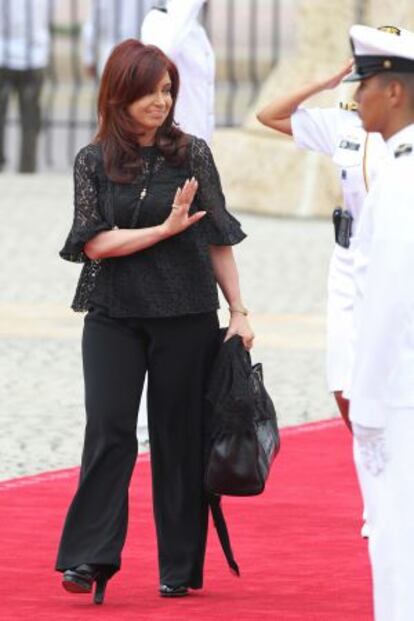Argentina's seizure of Repsol arm exposes crude division
Venezuela says it is willing to help Argentina with "all aspects" of nationalization Mexican president warns that expropriation will hurt future investments in Argentina

Regional leaders have been cautious in their reactions to Monday's surprise announcement by Argentinean President Cristina Fernández de Kirchner to expropriate Repsol's affiliate YPF and fire the petroleum firm's managers in a matter of hours.
One of Fernández de Kirchner's biggest allies, Venezuelan President Hugo Chávez, who has nationalized nearly all his country's oil industry, applauded her move. In a statement, Foreign Minister Nicolás Maduro said that Venezuela was prepared to help Argentina with "all the aspects" regarding nationalization.
But other traditional allies, such as Bolivia's President Evo Morales, tried to stay out of the fray. "It is an issue between Argentina and Spain," said Morales on Tuesday. "It is not going to cause us any problems because we have a very close relationship with Repsol."
In Mexico City, President Felipe Calderón told the press that Fernández de Kirchner's nationalization plan would only damage her chances for future investments as well as hurt Repsol, in which Mexico's state-run oil company Pemex holds a 10-percent stake. Calderón called her decision "very irresponsible and somewhat irrational."
This isn't the first time that Fernández de Kirchner has caused concern for Spanish investors. In 2008, she nationalized privately run pension funds, which many Spaniards had invested in. She also nationalized Aerolíneas Argentina, which had been owned by the now-bankrupt Marsans travel agency, another Spanish firm.
US State Department spokesman Mark Toner on Tuesday explained remarks made earlier by Secretary of State Hillary Clinton, who said that she wanted to study the matter before commenting on it. "She spoke about the need for diverse markets, and certainly that's one of our core beliefs: diverse energy markets," Toner said. Spanish Foreign Minister José Manuel García-Margallo had said he was disappointed about the US position.
In Buenos Aires, the Peronist youth organization, Cámpora, headed by the president's son Máximo, was one of the first out in the streets to celebrate the YPF takeover.
"This president isn't going to bow down to any threats," Fernández de Kirchner told supporters regarding the warnings from Spain and the European Union. "I am chief of state, not a thug."
About 100 Cámpora members chanted: "Cristina, Cristina, sweetheart, here you have the support of your kids." The Cámpora, which has grown since the death of former President Néstor Kirchner, is made up of some of the most influential public servants, including Mariano Recalde, Aerolíneas Argentinas president. They were the first to stand up to applaud when Fernández de Kirchner made her announcement.
Nevertheless, Fernández de Kirchner's critics expressed concern. "Last night I could not stop thinking about the millions who are going to be committed to paying back billions of dollars for many years to come," said Buenos Aires Mayor Mauricio Macri, one of the president's bitter rivals, on Tuesday.
Repsol chairman Antonio Brufau said that he would not accept anything less than nine billion euros. He not only painted the takeover as a diversion from Argentina's current social and economic crisis, but also questioned why it came just months after YPF announced a large oil find known as the Vaca Muerta field under a rocky formation stretching across Neuquén and Mendoza provinces.
Repsol officials estimate the Vaca Muerta discovery could yield as much as four billion barrels of crude and help Argentina meet its energy supplies for many years to come.
Tu suscripción se está usando en otro dispositivo
¿Quieres añadir otro usuario a tu suscripción?
Si continúas leyendo en este dispositivo, no se podrá leer en el otro.
FlechaTu suscripción se está usando en otro dispositivo y solo puedes acceder a EL PAÍS desde un dispositivo a la vez.
Si quieres compartir tu cuenta, cambia tu suscripción a la modalidad Premium, así podrás añadir otro usuario. Cada uno accederá con su propia cuenta de email, lo que os permitirá personalizar vuestra experiencia en EL PAÍS.
¿Tienes una suscripción de empresa? Accede aquí para contratar más cuentas.
En el caso de no saber quién está usando tu cuenta, te recomendamos cambiar tu contraseña aquí.
Si decides continuar compartiendo tu cuenta, este mensaje se mostrará en tu dispositivo y en el de la otra persona que está usando tu cuenta de forma indefinida, afectando a tu experiencia de lectura. Puedes consultar aquí los términos y condiciones de la suscripción digital.








































